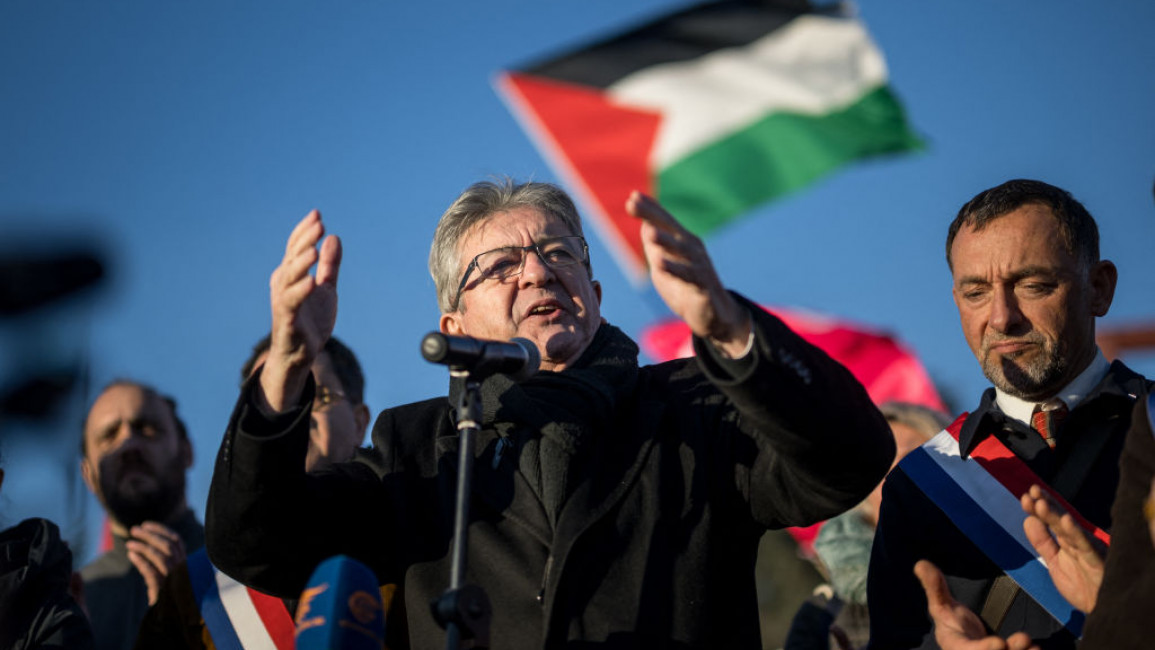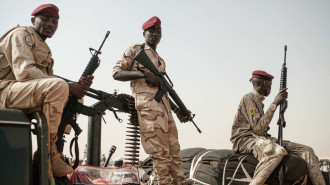France's Left figurehead Jean-Luc Melenchon supports 'Lebanese resistance' amid Israel's massacres
Jean-Luc Mélenchon, the figurehead of France's largest leftist coalition, has voiced support for "the Lebanese resistance" amidst deadly Israeli attacks on Lebanon.
On 23 September, Lebanon's deadliest day in two decades, the Morocco-born politician condemned the massacre committed by "the occupation army of Netanyahu," which resulted in 492 deaths and forced tens of thousands to flee for safety.
The Israeli military said it struck 1,600 Hezbollah targets in an operation aimed at dismantling infrastructure built up since the 2006 war.
Lebanon's health ministry reported that among the dead were 35 children and 58 women, while 1,645 others were wounded.
"Full support for the national resistance of the Lebanese," added the founder of La France Insoumise Party (LFI).
Mélenchon's statement has been widely interpreted as support for Hezbollah, known as the country's resistance group, despite him not explicitly naming it.
Hundreds of social media users with Israeli flags and far-right slogans have accused the leftist leader—who has previously refused to condemn Hamas—of antisemitism and supporting terrorism, allegations he has long refuted.
In 2013, France designated Hezbollah's military wing as a terrorist organisation, although it distinguishes between the military and political aspects of the group.
Paris' allies, the US, Germany, and Britain, classify the whole group as a "terrorist organisation", but French officials have long argued that ostracising it would hinder efforts to resolve the political crisis in the Middle Eastern country.
Since the start of Israel's war on Gaza, France's New Popular Front (NFP)–which includes LFI, the Socialist Party, Greens, French Communist Party–has condemned the Israeli war on Gaza as "genocide" and has protested for a ceasefire.
The party's MP, Sébastien Delogu, was suspended in May for brandishing the Palestinian flag inside the French parliament.
Recognising the State of Palestine was a central promise of the NFP during their campaign, along with raising public sector wages and imposing a wealth tax.
Macron refuses to let pro-Palestine left govern
NFP secured the most seats in the legislative elections; however, President Emmanuel Macron refused to appoint a Prime Minister from the left-wing coalition. Macron cited "institutional stability," arguing that any NFP PM would likely face a no-confidence vote when Parliament reconvenes in October.
With 193 seats, the NFP is far from the 289-seat majority needed in the 577-member National Assembly and would require support from other parties. Yet, the other blocs are in even weaker positions, with Macron’s centrist camp holding 166 seats and Marine Le Pen’s right allies having 142.
Instead, Macron appointed conservative Michel Barnier to lead a government largely backed by the conservative Republicans and centrist groups, maintaining a neutral stance from the far right.
France Insoumise has strongly denounced this as a Macronite "coup" against the election results and calls for Parliament to oust Macron under constitutional article 68 ("dereliction of duty").
France's position on Israeli attacks in Lebanon
Since the Beirut port explosion, Macron has made it clear that he wants Paris to help set Lebanon on a new course after decades of corrupt rule that have led to its deepest economic and political crisis since the 1975-1990 civil war.
On 19 September, Macron addressed the Lebanese people in a heartfelt speech, just three days after the explosion of electronic devices that claimed dozens of lives.
"In this confusion, in this sorrow, France stands by your side," he said. He faced widespread criticism from pro-Palestine activists who viewed his statement as a hollow euphemism, as he failed once again to condemn Israel, a key ally in Macron's centrist foreign policy.
The bombings involving pagers and walkie-talkies, widely believed to have been staged by Israel, resulted in 37 deaths, including two children, and around 3,000 injuries.
Israel has neither confirmed nor denied its involvement. In response, Hezbollah, an Iranian-backed Shiite group, launched over 100 rockets into northern Israel, with some landing near Haifa. Israel retaliated with hundreds of strikes on Lebanon, warning residents in southern and eastern areas to evacuate ahead of a widening air campaign against Hezbollah.
President Macron has warned Israeli Prime Minister Benjamin Netanyahu that Israel is pushing the region toward war, to which Netanyahu responded with "it's time for France to increase the pressure on Hezbollah instead of Israel," according to Israeli media.







 Follow the Middle East's top stories in English at The New Arab on Google News
Follow the Middle East's top stories in English at The New Arab on Google News
![Lebanon after strikes [Getty]](/sites/default/files/styles/image_330x185/public/2184409977.jpeg?h=a5f2f23a&itok=7wpfQMyI)
![G20 Brazil [Getty]](/sites/default/files/styles/image_330x185/public/2184389194.jpeg?h=a5f2f23a&itok=t1DchCMY)
